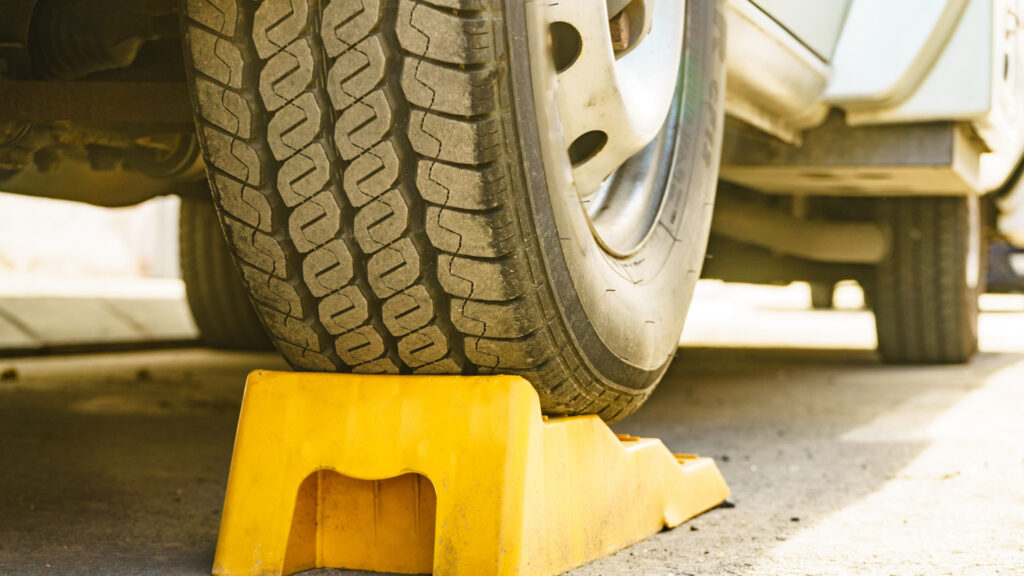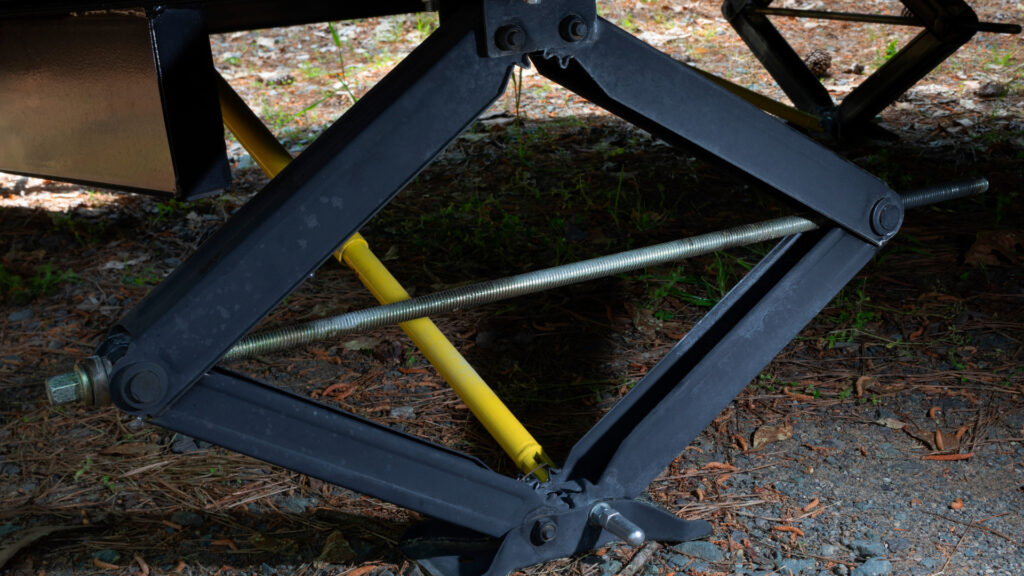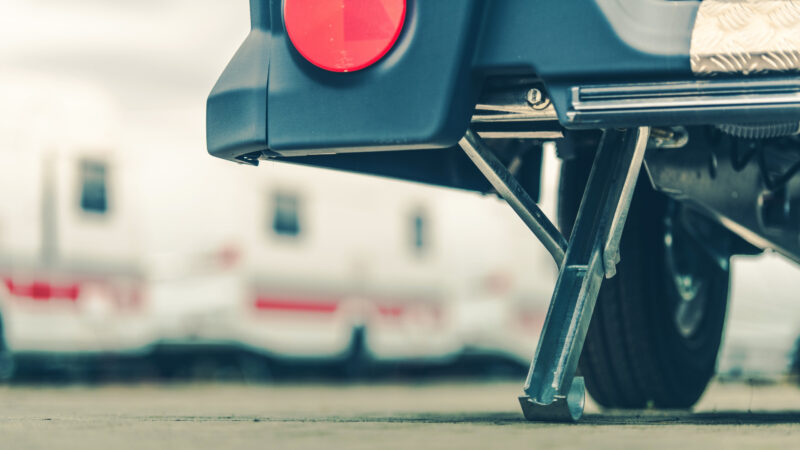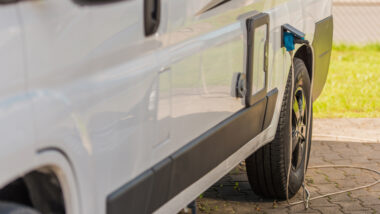Table of Contents Show
Leveling your RV is essential to ensure comfort and safety while camping.
However, one question we often see asked regarding leveling is whether or not your RV tires should come off the ground. We’ll warn you; the RV community strongly debates this issue.
Lucky for you, we’re saving you the hassle and potential of getting into a heated discussion online. We’ll take one for the team and back up our stance with facts instead of opinions.
Today, we’re answering whether or not your RV tires should come off the ground when leveling.
The Ups and Downs of RV Leveling
We always love seeing RVers asking for advice. With so many new owners, many people are asking great questions. Many new RVers have asked about tires coming off the ground during the process.
Recently, a fellow RVer asked the community about this very topic on Facebook. They quickly got a taste of both sides of the discussion. Despite a few boneheaded comments, the RVer received solid tips and advice from the group.
Wheel or No Wheel: The Great Leveling Debate
As with most heated discussions, you have two sides to every debate. One side maintains a “send it” attitude. They argue that there’s nothing wrong with the wheels coming off the ground.
Many on this side of the discussion claim that these leveling systems can lift and hold the camper’s weight just fine.
However, the opposite side believes in keeping all their wheels on the ground. They state that the wheels help absorb weight, provide stability, and create a safer experience. If the wheels come off the ground, they’ll stop the leveling process immediately and address the issue.
So who is right in this discussion? What should you do when leveling your camper? Don’t worry; we’ll dive deeper into the debate and give some answers.
Should Your RV Tires Leave the Ground When Leveling?
No matter what you’ve seen, heard, or done in the past, your RV tires should stay on the ground. Leveling systems may be strong and capable of lifting enormous amounts of weight; however, it’s unsafe. Technology and components can fail, which could cause a dangerous situation.
Always chock your tires with beefy rubber wheel chocks when parking. These blocks keep your wheels in place and prevent any accidental movements. However, Marc from “Keep Your Daydream” demonstrated that they play an essential role in leveling.
When your tires leave the ground, you no longer benefit from your wheel chocks. The jacks on your leveling system hold all the weight.
In a perfectly flat campsite, this may not create an issue. However, as Marc and Trish experienced, this can cause weight to shift and jacks to bend when parked on unlevel surfaces.
“Keep Your Daydream” got lucky and visited the Grand Design rally with a team of certified technicians readily available. They discovered no damage to their rig but stated it could have ended in disaster.
We strongly recommend keeping all of your wheels on the ground at all times. It’s not a risk we think is worth taking.
What Is the Proper Way to Level an RV?
You must learn to level your RV correctly to avoid a disastrous situation. Take your time when going through this process.
Trust us; these situations typically don’t go smoothly when you try to rush them. Let’s look at what you must do to park and level your camper safely.
Find a Level Spot
The first step in the process is to find a level spot. If you park at a campsite, you may have little say in how or where you place your rig. However, for those who enjoy boondocking, there’s more freedom in how and where you place your rig.
Even if you have an auto-leveling system, do it a favor and get it as level as possible. You don’t want to make it work any harder than it has to. This is where having the Level Mate Pro comes in handy.
- EXCLUSIVE, USER-FRIENDLY APP AND FEATURES: LevelMate is the only device that can display level positions from both...
- FUSS-FREE LEVELING: LevelMatePRO is an essential RV accessory that saves you time for leveling. It provides real-time...
You can easily see how level your trailer is without getting out of the vehicle. Sometimes moving a short distance is all it takes.
Level Side to Side
Once you find the flattest spot at your campsite, level your RV side to side. One of the easiest ways to do this is to use the Andersen Leveler System.
- 🛻[MUST HAVE FOR CAMPERS OR FIFTH WHEEL]: Works great on trailers up to 30,000 lbs and with tires up to 32" diameter....
- 🛻[EASY TO USE]: Just drive on, decide how high you want it and place the chocks! You'll be ready to go dirt biking or...
Place these crescent-shaped blocks under the tires on the lowest side of your camper. You can then raise the low side by four inches using these blocks. Some RVers carry long pieces of wood instead of the Andersen blocks.
You can choose either method. However, you can help your leveling system by getting your trailer as level as possible. This drastically reduces the chances of your wheels coming off the ground.
Chock Your Wheels
After leveling your trailer from side to side, put your wheel chocks in place. We strongly suggest getting some heavy-duty chocks made from solid rubber, especially if you have a larger rig. These will hold your RV in place and prevent any accidental movement.
You should have a set of chocks for both sides of your trailer. Place them at the front and rear of your axles to lock everything in place. While it may not always be necessary, we subscribe to the “it’s better safe than sorry” motto.
- Compact Size: Measuring approximately 8 inches in length, 4 inches in width, and 5 inches in height, these wheel chocks...
- All-Weather Construction: Built for durability in any climate, these wheel chocks feature all-weather construction,...

Level Front to Back
With your wheels chocked, you can activate your auto-leveling system. It usually only takes pressing a button or two on the controller.
The sequence for these typically lowers the front of the rig first. It then raises it until the whole system levels from front to back.
Once the system levels your RV, it’ll adjust your trailer side to side perfectly. This may only require minor adjustments depending on how good of a job you did earlier. However, if you don’t raise the low side enough, the tires may come off the ground.
Stabilize Your Rig
Once your rig is level, you can lower your stabilizers. Some auto-leveling systems will lower these jacks last. These reduce the bouncing inside your RV.
Avoid cranking them down too hard if your RV has manual stabilizing jacks. These are not leveling jacks and should not be used to lift your camper. You can cause severe and permanent damage to them if you do.
Keep in Mind: Wheel chocks can prevent serious damage to your RV! See why wheel chocks are necessary and the best options on the market.

Open Slides
Now that your rig is level and stabilized, you can open your slides. Be mindful of how much space you’ll need when opening them.
If it may get close to another object, have someone stand outside and watch as you open each slide. You can cause severe damage by opening the slide of your RV into a pole, tree, or other object.
Make Unforgettable Memories
Now you can make unforgettable memories with your loved ones in your leveled RV. This leveling process may seem difficult at first, but it gets easier.
The more you can camp and change campsites, the more you can hone your skills. It can take time, but you’ll be leveling your camper with all your wheels on the ground like a pro in no time.
Take the time to make the most of the experience and take lots of pictures. You’ll likely want to look back on them years from now.
Keep in Mind: Before you hit the road, make sure you have these 10 Problem Solving Products packed for Your Next RV Travel Day
Stay Safe and Keep Your RV Ground
Keeping your RV level and on the ground ensures a safe and enjoyable camping experience.
Lifting the tires off the ground can cause weight distribution and stability issues. It can also stress the suspension and tires unnecessarily, causing severe damage.
Using leveling aids and stabilizing jacks secures and stabilizes your RV while parked. We’re a fan of anything you can do to reduce the risk of accidents or damage.
So, whether you’re a seasoned RVer or a newbie, stay safe and keep your RV grounded.
Last update on 2024-12-26 / Affiliate links / Images from Amazon Product Advertising API









